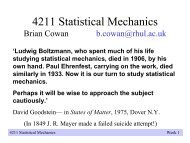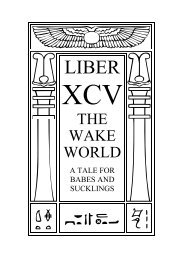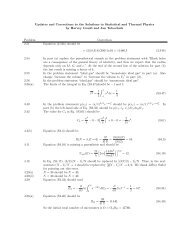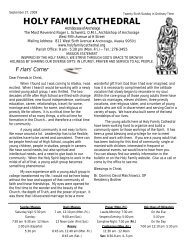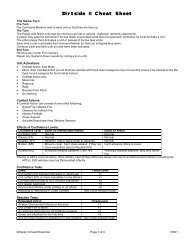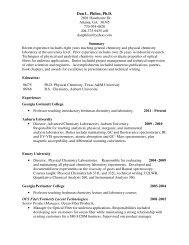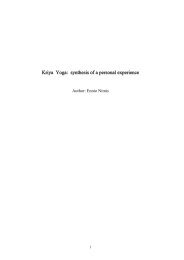Manifesto of the Communist Party - WebRing
Manifesto of the Communist Party - WebRing
Manifesto of the Communist Party - WebRing
You also want an ePaper? Increase the reach of your titles
YUMPU automatically turns print PDFs into web optimized ePapers that Google loves.
great extent, <strong>the</strong> history <strong>of</strong> <strong>the</strong> modern working-class movement; at present it is undoubtedly <strong>the</strong><br />
most widespread, <strong>the</strong> most international production <strong>of</strong> all Socialist literature, <strong>the</strong> common platform<br />
acknowledged by millions <strong>of</strong> working men from Siberia to California.<br />
Yet, when it was written, we could not have called it a Socialist <strong>Manifesto</strong>. By Socialists, in<br />
1847, were understood, on <strong>the</strong> one hand, <strong>the</strong> adherents <strong>of</strong> <strong>the</strong> various Utopian systems: Owenites<br />
in England, Fourierists in France, both <strong>of</strong> <strong>the</strong>m already reduced to <strong>the</strong> position <strong>of</strong> mere sects, and<br />
gradually dying out; on <strong>the</strong> o<strong>the</strong>r hand, <strong>the</strong> most multifarious social quacks, who, by all manners <strong>of</strong><br />
tinkering, pr<strong>of</strong>essed to redress, without any danger to capital and pr<strong>of</strong>it, all sorts <strong>of</strong> social<br />
grievances, in both cases men outside <strong>the</strong> working-class movement, and looking ra<strong>the</strong>r to <strong>the</strong><br />
"educated" classes for support. Whatever portion <strong>of</strong> <strong>the</strong> working class had become convinced <strong>of</strong><br />
<strong>the</strong> insufficiency <strong>of</strong> mere political revolutions, and had proclaimed <strong>the</strong> necessity <strong>of</strong> a total social<br />
change, that portion <strong>the</strong>n called itself <strong>Communist</strong>. It was a crude, rough-hewn, purely instinctive<br />
sort <strong>of</strong> Communism; still, it touched <strong>the</strong> cardinal point and was powerful enough<br />
page 13<br />
amongst <strong>the</strong> working class to produce <strong>the</strong> Utopian Communism, in France, <strong>of</strong> Cabet, and in<br />
Germany, <strong>of</strong> Weitling. Thus, Socialism was, in 1847, a middle-class movement, Communism a<br />
working-class movement. Socialism was, on <strong>the</strong> Continent at least, "respectable"; Communism<br />
was <strong>the</strong> very opposite. And as our notion, from <strong>the</strong> very beginning, was that "<strong>the</strong> emancipation <strong>of</strong><br />
<strong>the</strong> working class must be <strong>the</strong> act <strong>of</strong> <strong>the</strong> working class itself,"[19] <strong>the</strong>re could be no doubt as to<br />
which <strong>of</strong> <strong>the</strong> two names we must take. Moreover, we have, ever since, been far from repudiating it.<br />
The "<strong>Manifesto</strong>" being our joint production, I consider myself bound to state that <strong>the</strong><br />
fundamental proposition, which forms its nucleus, belongs to Marx. That proposition is: that in<br />
every historical epoch, <strong>the</strong> prevailing mode <strong>of</strong> economic production and exchange, and <strong>the</strong> social<br />
organization necessarily following from it, form <strong>the</strong> basis upon which is built up, and from which<br />
alone can be explained, <strong>the</strong> political and intellectual history <strong>of</strong> that epoch; that consequently <strong>the</strong><br />
whole history <strong>of</strong> mankind (since <strong>the</strong> dissolution <strong>of</strong> primitive tribal society, holding land in<br />
common ownership) has been a history <strong>of</strong> class struggles, contests between exploiting and<br />
exploited, ruling and oppressed classes; that <strong>the</strong> history <strong>of</strong> <strong>the</strong>se class struggles forms a series <strong>of</strong><br />
evolutions in which, now-a-days, a stage has been reached where <strong>the</strong> exploited and oppressed class<br />
-- <strong>the</strong> proletariat -- cannot attain its emancipation from <strong>the</strong> sway <strong>of</strong> <strong>the</strong> exploiting and ruling class<br />
-- <strong>the</strong> bourgeoisie -- without, at <strong>the</strong> same time, and once and for all, emancipating society at large<br />
from all exploitation, oppression, class distinctions and class struggles.<br />
This proposition which, in my opinion, is destined to do for history what Darwin's <strong>the</strong>ory has<br />
done for biology, we, both <strong>of</strong> us, had been gradually approaching for some years<br />
page 14<br />
before 1845. How far I had independently progressed towards it, is best shown by my "Condition<br />
<strong>of</strong> <strong>the</strong> Working Class in England."[*] But when I again met Marx at Brussels, in spring, 1845, he<br />
had it ready worked out, and put it before me, in terms almost as clear as those in which I have<br />
stated it here.<br />
From our joint preface to <strong>the</strong> German edition <strong>of</strong> 1872, I quote <strong>the</strong> following:



